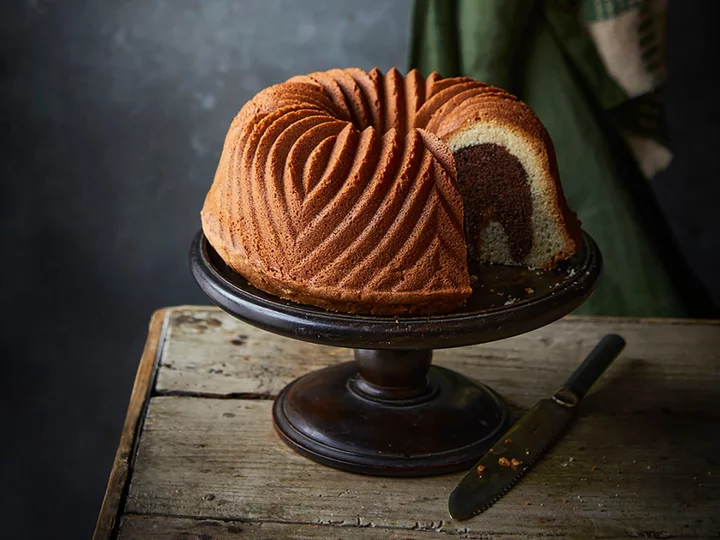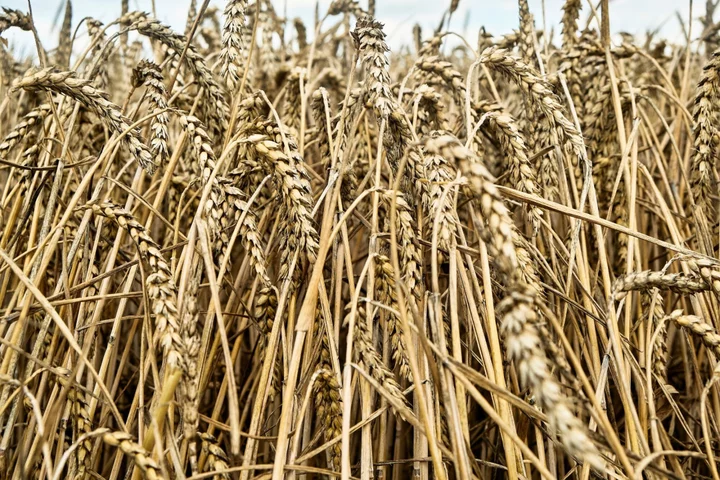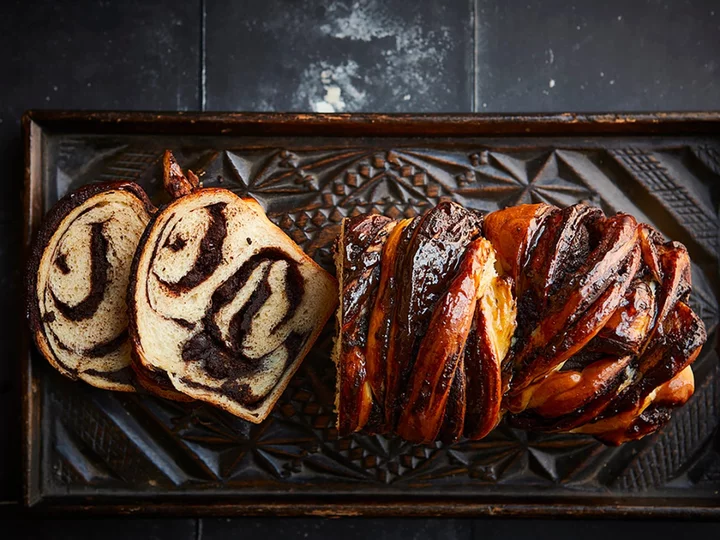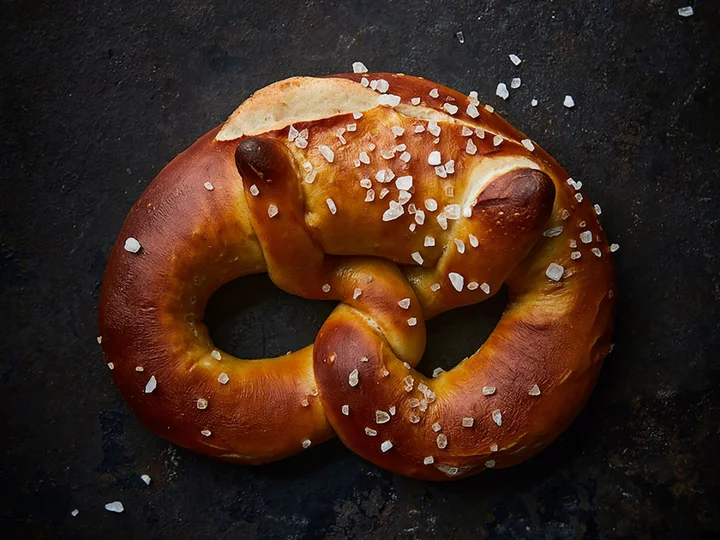
Quick, moist and flavourful: Jurgen Krauss’s marble cake
This cake was a standard on our Sunday coffee table and has a lot of nostalgia for me. It is quick to make, moist and flavourful, and the marble pattern was always fascinating to me as a child,” says former contestant on The Great British Bake Off, Jurgen Krauss. Marble cake Serves: 12-24, depending on tin size. The amounts given are for a loaf tin (950g) or a Bundt tin. For a bigger Bundt tin, double the amounts and bake for 15 minutes longer. Ingredients: For the batter: 125g unsalted butter or margarine, room temperature 2 tsp vanilla extract 2 eggs, separated 180g caster sugar 250g plain flour 8g baking powder 125ml whole milk For the chocolate batter: 10g cocoa powder 15g caster sugar 25ml double cream ¼ tsp ground cloves Method: 1. Preheat the oven to 170C fan/gas mark 5. 2. Put the butter in a bowl and, using a hand mixer or a stand mixer fitted with the balloon whisk, beat the butter until it is light and pale. Add the vanilla extract and egg yolks, alternating with the sugar bit by bit, and whisk for another 15 minutes until the butter and sugar mix is very frothy and white. 3. Sift the flour and baking powder together in a bowl. Alternate adding the flour and milk bit by bit to the batter while whisking on a low speed. 4. In a separate bowl, whisk the egg whites to soft peaks. Fold the egg whites into the butter and flour mixture. 5. For the chocolate batter, take one third of the plain batter and put it into a separate bowl. Fold in the ingredients for the chocolate batter. Put the two batters in a greased 950g Bundt tin or a loaf tin, starting with the vanilla batter, then add a layer of chocolate batter and finish with vanilla batter. Use a fork to create the marble effect by pulling it through the layers of batter with a swirling motion. Bake for about one hour; the cake should start separating from the tin and a skewer inserted into the cake should come out clean. Cover with foil if the top of the cake starts getting too dark. 6. Leave the cake to cool in the tin for at least 20 minutes before attempting to take it out of the tin. 7. This cake keeps very well for up to a week in an airtight container and for the first three days its flavour actually improves. ‘German Baking: Cakes, Tarts, Traybakes And Breads From The Black Forest And Beyond’ by Jurgen Krauss (published by Kyle Books on 31 August, £26). Read More The dish that defines me: Evelin Eros’s rum cake ‘It started with a radish’: Chef Simon Rogan reflects on restaurant L’Enclume at 20 The true story – and murky history – of Portuguese piri piri oil ‘My depression stopped me doing what I loved most in life – cooking’ What Bake Off’s Jurgen Krauss really thinks of his shock elimination How to pull off a traditional German babka chocolate braid
2023-08-30 14:00

Wheat Edges Higher as Hostilities Escalate Again in Black Sea
Wheat rose from the lowest level since early June as hostilities between Ukraine and Russia ramped up again
2023-08-30 13:50

How to pull off a traditional German babka chocolate braid
What looks more stunning than the randomly swirling bands of dark chocolate in this loaf of white sweet bread? This style of braiding is known in many countries, and is used with different fillings as well,” says former contestant on The Great British Bake Off, Jurgen Krauss. “Always an eye-catcher, it used to be a special treat on our Saturday afternoon coffee table. The rich spices and citrus zest in combination with chocolate make this truly a great braid for any special occasion.” Babka chocolate braid Serves: 15 Ingredients: For the dough: 190g bread flour 140g white spelt flour or plain flour, plus extra for dusting 6g instant yeast 1 pinch salt 40g caster sugar 180ml whole milk 1 medium egg 40g unsalted butter, softened Zest of 1 lemon Zest of 1 orange ½ tsp ground cardamom For the filling: 100g dark chocolate (54% or 70% cocoa solids, to taste) 60g unsalted butter 60g soft light brown sugar 2 tsp ground cinnamon ½ tsp ground cloves 30g cocoa powder Unsalted butter, melted, or apricot jam for glazing Method: 1. For the dough, put all the ingredients in a bowl and, using your hands or a stand mixer fitted with the dough hook, mix the ingredients until evenly distributed. Then knead the dough for several minutes until it has a smooth and silky texture. Cover with a tea towel or a plastic bag and leave to prove at room temperature for about one hour. Check with the poke test that the dough is ready. 2. Meanwhile, prepare the filling. Put the chocolate, butter and sugar into a pan and melt over low heat. Once liquid, take the pan off the heat and add the cinnamon, cloves and cocoa powder. It’s OK if the filling looks grainy. 3. Line a 950g loaf tin with baking paper. 4. On a lightly floured surface, roll out the dough to a rectangle measuring about 50 x 30cm. Spread the chocolate filling over the dough rectangle, leaving 2cms of the far short edge uncovered. Roll up the dough rectangle, starting at the near short edge. Seal the seam by pinching it. 5. Place the roll on a work surface with the seam facing down and, with a sharp knife, cut the roll lengthwise into halves. Twist the halves together to form a rope. You can do this starting at one end and twist this half of the roll, and then do the same for the other half; this way you don’t have to manipulate the whole length at once. 6. Place your hands palm down on the ends and, with a scooping movement, bring the ends to meet underneath the middle of yourrope. Transfer this into the lined tin, and cover with a tea towel or a plastic bag. Leave to prove for 30 minutes to one hour until the Babka is well risen and the dough starts to feel fragile; a gentle touch with a finger will leave a dent that only slowly recovers. 7. Preheat the oven to 170C fan/gas mark 5. 8. Bake the babka for 30-40 minutes. 9. Melt the butter for glazing or heat the apricot jam with a teaspoon of water. Brush the babka with melted butter or jam as soon as it is out of the oven. Leave to cool for about 15 minutes, then carefully remove from the tin and baking paper. 10. Let the babka cool completely before eating. Stored in an airtight container it will last for three days. ‘German Baking: Cakes, Tarts, Traybakes And Breads From The Black Forest And Beyond’ by Jurgen Krauss (published by Kyle Books on 31 August, £26). Read More The dish that defines me: Evelin Eros’s rum cake ‘It started with a radish’: Chef Simon Rogan reflects on restaurant L’Enclume at 20 The true story – and murky history – of Portuguese piri piri oil ‘My depression stopped me doing what I loved most in life – cooking’ What Bake Off’s Jurgen Krauss really thinks of his shock elimination Quick, moist and flavourful: Jurgen Krauss’s marble cake
2023-08-30 13:49

Knotty and nice: Jurgen Krauss’s homemade soft pretzel recipe
Pretzels, or brezel or brezen in German, are the most iconic German food. Ornaments of pretzels adorn every bakery, and images of them can be found on medieval church windows in Freiburg, where I come from,” says former contestant on The Great British Bake Off, Jurgen Krauss. “Often, a pretzel works better as a soother for an upset baby than a dummy. They are a part of my upbringing and heritage. And still, there is no better snack after a long shopping spree through my hometown of Freiburg than a brezel from the bakery at the tram stop. “Disclaimer about lye: I am giving two options for the finish. One is using lye, which involves a very dangerous chemical, solid sodium hydroxide. The other option uses baking soda, which is bicarbonate of soda, and is not dangerous at all. The results are different in colour and taste, but without a direct comparison, the bicarbonate of soda pretzel can stand its ground. If you intend to use lye, I’d recommend baking a few batches of pretzels with bicarbonate of soda, but treat it as if it was lye, to practise the handling and have everything in the right place before starting.” Soft pretzel Makes: 8-10 Ingredients: For the starter: 100g bread flour 2g salt 1⁄8 tsp instant yeast 65ml water For the dough: 400g bread flour 9g salt 20g honey 5g instant yeast 25g unsalted butter, room temperature 180ml water Coarse salt crystals, for sprinkling For the lye or bicarb dipping solution: 2L water 8g salt 80g bicarbonate of soda or 80g sodium hydroxide pellets Method: 1. Prepare the starter the day before baking. Combine all the ingredients in a bowl and mix with your hand or a spatula until all the flour is incorporated. Cover with clingfilm and leave to stand at room temperature for about two hours. Then put the starter in the fridge overnight until you need it – it will be good to use for up to three days. 2. About one hour before making the main dough, take the starter out of the fridge. 3. To make the main dough, combine all the ingredients except the salt crystals and the starter in a bowl and mix with your hand or a spatula. The resulting dough will be very stiff. Knead the dough on a work surface for about 10 minutes. Don’t use any additional flour, you won’t need it anyway. The resulting dough should be smooth and a bit elastic. Put the dough into a bowl, cover and prove at room temperature for about two hours. Fold the dough once after one hour. 4. Meanwhile, prepare the dipping solution. Use a big stainless-steel pan and stainless-steel spoons for dipping. Cover your normal work surfaces in case the lye spills. When dipping, keep the baking sheets very close to the lye pan and the oven. Always wear protective gloves and goggles when working with sodium hydroxide and lye. Never ever touch sodium hydroxide pellets with your skin. 5. If using bicarbonate of soda, bring the water to boil. Switch off the heat, add the salt and stir. Then add the bicarbonate of soda – there will be a bit of frothing and splashing, so be careful. Leave to cool. 6. If using sodium hydroxide, put the water in the pan and then add the sodium hydroxide pellets. Sodium hydroxide creates a lot of heat when it dissolves. 7. Once the dough has proved, divide it into pieces weighing 85 grams each. Roll each piece of dough into a cylinder. Once all the pieces have been rolled, start again with the first piece, to roll it into a long strand with thin ends and a belly in the middle. Aim for a length of 60 centimetres. Make sure you don’t tear your strands – if there is too much resistance in the dough, move on to the next strand. You will need several cycles to reach the length required. 8. Now shape the pretzels – the bakers use a slinging method, but there is a simpler, slower way to do this. Make sure the ends of the little arms are well attached to the middle bit. 9. Place the pretzels onto lined baking trays, cover and leave to prove at room temperature for about 45 minutes. Uncover the pretzels and put them in the fridge for 30 minutes, so that a skin can form. Preheat the oven to 230C fan/gas mark 9. 10. Take the pretzels out of the fridge. Dip each pretzel in lye or sodium carbonate solution for about five seconds. Transfer the pretzel back onto the lined baking sheet. One sheet will hold four to five pretzels. Once the sheet is full, slash the thickest part of the pretzels with a sharp serrated knife and sprinkle with salt crystals. Transfer to the oven immediately and bake for 12–15 minutes. Leave to cool on a wire rack. Repeat with the remaining pretzels. 11. Because of the salt, these pretzels are best eaten fresh. ‘German Baking: Cakes, Tarts, Traybakes And Breads From The Black Forest And Beyond’ by Jurgen Krauss (published by Kyle Books on 31 August, £26). Read More The dish that defines me: Evelin Eros’s rum cake ‘It started with a radish’: Chef Simon Rogan reflects on restaurant L’Enclume at 20 The true story – and murky history – of Portuguese piri piri oil ‘My depression stopped me doing what I loved most in life – cooking’ What Bake Off’s Jurgen Krauss really thinks of his shock elimination How to pull off a traditional German babka chocolate braid
2023-08-30 13:47

What Bake Off’s Jurgen Krauss really thinks of his shock elimination
Jurgen Krauss’s elimination from the 2021 Great British Bake Off caused such a scandal, Ofcom received 115 viewer complaints. The lovable German baker was seen as a top competitor, winning three star baker prizes before being booted off in the semi-finals. Nearly two years on, Brighton-based Krauss, 58, has no hard feelings – but he did see the uproar coming. “I had a feeling there would be complaints – a feeling that people would take it very seriously,” he says. But he still has only good things to say about the show, noting the “overwhelmingly positive reaction was quite amazing”, and crediting the experience with boosting his baking skills massively. He speaks particularly fondly about the period before the competition started, when the contestants were in a bubble and testing their recipes. “We had nine weeks to prepare one signature and one showstopper each week and submit the recipe – that was really a huge time for growth,” he says. He calls this a period of “non-stop new ideas, non-stop new processes”, adding with a wry laugh: “Most of the things I’d done in the tent I’d never done before, and some of them I’ve never done since, [and] I’m not sure I’ll ever do them again. It was tough – it was amazing.” Many of the bakes Krauss made on the show were inspired by his childhood in the Black Forest, Germany. This formed the start of his new cookbook, aptly called German Baking: Cakes, Tarts, Traybakes And Breads From The Black Forest And Beyond. “During Bake Off, the briefs of all these signature bakes often included references to childhood that really reconnected me to my culinary home, to the Black Forest and the cooking of my parents, the things I liked to eat as a child or teenager, or while I was studying.” Some of Krauss’ favourite food memories growing up are from the period before Christmas. “My brother and I, we were always in the kitchen with my mother, we were always part of cooking and baking Christmas – the time before Christmas was always amazing,” he remembers. “It was fun, getting hands sticky in dough and tasting it all, and using ingredients like kirsch [brandy made from cherries]. I didn’t think much of it, being able to make cakes like cheesecakes or Linzer torter [a spiced tart that would kick off the Christmas period in Krauss’ household]. “But then much later, after the move to England [in 2003], I really took a deep dive into making bread. After 10 years or so, I really was craving German bread.” From apple marzipan tarts to the classic Black Forest gateau, Krauss’ book is an ode to his childhood and where he grew up. “Black Forest is an interesting region, because it has influences from France and Austria,” Krauss explains. “It had a varied history. It was Austrian for almost 200 years – you get dark breads, but rye isn’t such a dominant grain as it is in other German areas. That’s the Austrian influence – you get a lot more wheat and you get things like pancakes and dumplings, more than in other German areas, which is clearly inspired by the Austrian kitchen. “You have also a huge influence from France and Alsace in terms of day-to-day cooking, so it’s a bit of a conglomerate.” Despite its name, Krauss suggests the Black Forest gateau was actually invented in Dortmund – a city around five hours’ drive away from his home. “But it has become iconic because on the borders of the Black Forest in the Rhine Valley there are huge orchards and cherries grow very well there. Making kirsch has a long tradition, making fruit brandies has a long tradition in the Black Forest because of that.” Other recipes in the book include the Flammkuchen, or what Krauss describes as “kind of a Black Forest pizza”. “It’s an unleavened bread, so you could say it’s a matzah with sour cream on it, and you can put lardons on it, onions, or you can make it sweet with cinnamon sugar and apple slices. It’s really so easy – you can have it ready in 20 minutes, from start to finish. You just need to have an oven that goes really hot.” While the book is all about traditional German baking, Krauss has added the occasional modern twist. He says animal products are prominent in German cooking, “And they don’t run very strongly through my bakes in the book, because I wanted to make it appealing to a very wide audience. So I didn’t use lard, where a traditional Black Forest baker would probably use lard or lardons – things like that. I definitely scaled back on that. You would make dumplings or doughnuts in lard, you would fry them in lard – this sort of thing has lost its appeal over the last few years I think.” While he’s still known to many as “Jurgen from Bake Off”, Krauss says he’s come a long way since the show. “I feel much more in command of things,” he muses. “It feels a lot easier for me to change things. I got to a stage in bread baking where I can go fancy and know the outcome will be OK. I never had that with sweet things before Bake Off. “But now I can see how to change ingredients and how recipes work in general – so that’s a huge change.” ‘German Baking: Cakes, Tarts, Traybakes And Breads From The Black Forest And Beyond’ by Jurgen Krauss (published by Kyle Books on 31 August, £26). Read More How to save money in the kitchen according to top chefs The chef who hated food as a child Discovering Sierra Leonean flavours in South London The dish that defines me: Evelin Eros’s rum cake ‘It started with a radish’: Chef Simon Rogan reflects on restaurant L’Enclume at 20 The true story – and murky history – of Portuguese piri piri oil
2023-08-30 13:45

Meloni Weighs Further Aviation Moves After Italian Price Caps
Italian Prime Minister Giorgia Meloni’s decree capping ticket prices from Italy’s mainland to the islands of Sicily and
2023-08-30 12:46

Only one third of young South Koreans feel positively about marriage, survey finds
It's no secret young South Koreans are increasingly shunning marriage and parenthood -- the country's steeply falling birth rate is clear evidence of that.
2023-08-30 11:45

Mexico’s Femsa Sells $1.7 Billion Stake in Envoy in Latest Divestment
Mexico’s Fomento Economico Mexicano SAB sold a $1.7 billion stake in Envoy Solutions to BradyIFS as part of
2023-08-30 05:50

Sarah Jessica Parker adopted her 'And Just Like That' kitten in real life
Just call him nepo kitty.
2023-08-30 03:45

More Americans Plan Vacations, Even as They Sour on the Economy
Americans might be fretting about the job market and inflation, but it’s not stopping them from splurging on
2023-08-30 01:19

The UK economy still can't cope with the consequences of Brexit
The UK government has delayed health and safety checks on food imports from the European Union for the fifth time in three years amid fears that the additional red tape will push up food prices and disrupt vital supplies.
2023-08-30 00:45

Burger King must face lawsuit claiming its Whoppers are too small
By Jonathan Stempel A U.S. judge has rejected Burger King's bid to dismiss a lawsuit claiming that it
2023-08-29 22:57
